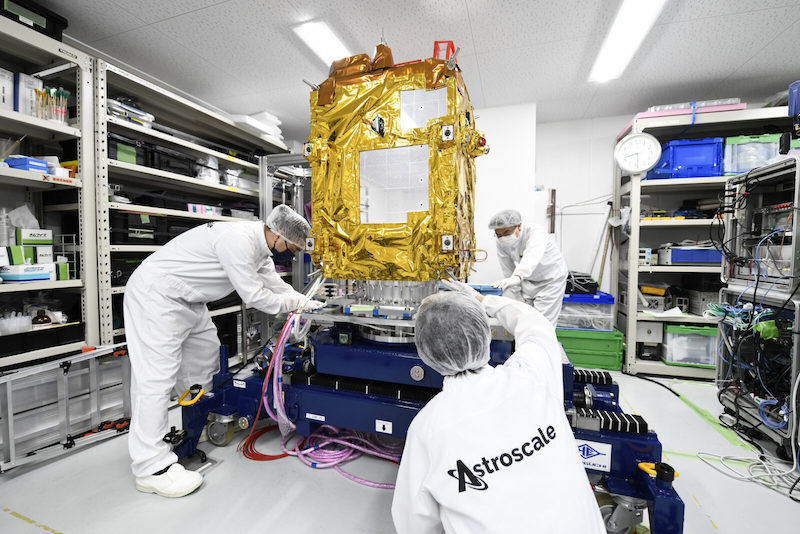Rocket Lab Targets Launch of Astroscale Orbital Debris Removal Satellite This Month

Astroscale’s ADRAS-J spacecraft. Photo: Astroscale
An orbital debris removal research project by Astroscale Japan Inc. is to launch later this month or in early March aboard an Electron rocket by Rocket Lab.
The Rocket Lab Electron, carrying Astroscale’s ADRAS-J satellite, is to lift off from Rocket Lab Launch Complex 1 in New Zealand.
“The mission is the first phase of an orbital debris removal program,” Rocket Lab said on Feb. 7. “The 150-kilogram ADRAS-J satellite will approach an aged, derelict rocket stage in orbit to observe it closely, understand how it behaves and determine potential methods for its assisted deorbiting in future. The rocket stage it will be observing is the Japanese H-2A upper stage left in low Earth orbit after the launch of the GOSAT Earth observation satellite in 2009. ADRAS-J will fly around the stage, 11 meters long and four meters in diameter, inspecting it with cameras. After deployment from Electron, Astroscale’s full mission will take between three and six months to complete.”
Read more: Astroscale Hopes ADRAS-J Mission Will Lay the Groundwork for Commercial Debris Removal
Astroscale’s ELSA-d orbital debris demonstrator launched in 2021, to show how it could push space objects into the Earth’s atmosphere where they would burn up. However, four of the servicer’s eight thrusters had experienced technical difficulties and Astroscale said that it would abandon its mission to capture a space object.
Astroscale announced that the mission had ended last month “with the safe and controlled de-orbit operations of the ELSA-d servicer satellite using the remaining operational thrusters.”
ADRAS-J represents “the world’s first attempt to safely approach, characterize and survey the state of an existing piece of unprepared large debris through rendezvous and proximity operations,” Astroscale said last month upon announcing the end of the ELSA-d mission.
Rocket Lab said on Feb. 7 that enabling ADRAS-J’s “rendezvous with a non-cooperative space object requires a dedicated launch, highly responsive mission planning and extremely tight margins on orbital parameters” and that the company “only received the final perigee, apogee, and inclination from Astroscale 20 days before launch.”
“The mission also demands highly accurate orbital insertion with tighter margins than required on most standard missions,” Rocket Lab said.
The upcoming ADRAS-J “On Closer Inspection” mission is to be Rocket Lab’s second launch this year and the 44th Electron mission, the company said.